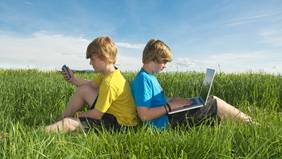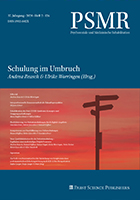Over 17,000 eight-year-old children in 16 countries on four continents were asked about their experiences and their views on their lives. No survey of this age group has ever before been undertaken. The second report on the "Children's Worlds study, which was published recently, reveals important results which can be used to improve childrens lives throughout the whole world. The Jacobs Foundation in Zurich financed the research work on which this report is based and has announced that it will also support the next stage. The new survey of children of between eight and twelve years of age will begin in 2017 and again cover an even larger number of countries.
The views of young children are rarely the subject of research. The "Childrens Worlds study has closed this gap. The survey asked children about all the important aspects of their lives, including family and home life, friends, money and possessions, school, local environment, time use, personal well-being, view on childrens rights and their general contentment. "This is the first opportunity we have had to compare childrens lives so comprehensively from the perspective of the children themselves, says Sabine Andresen of Goethe University Frankfurt, one of the principal investigators. "Children perceive the world around them very precisely and we can see who feels compromised in what areas.
Most of the eight-year-old children in the 16 countries examined were content with their lives and their situation, but there was a minority (about 6% of the children) who reported a lower level of well-being. The percentage of children with a lower sense of well-being varied from under 3% in Colombia and Romania to over 9% in Ethiopia, South Korea and the United Kingdom.
Simon Sommer, Head of Research at the Jacobs Foundation, said: "This project is pioneering. The report concentrates - for the very first time - on the opinions of eight-year-old children with regard to their lives and personal well-being. The Jacobs Foundation will continue to support "Children´s Worlds, as we are convinced that the study delivers unique and valuable information for everyone who has a special understanding for and an interest in the lives of children and adolescents and who devotes themselves to improving their lives and prospects.
Safety
Most of the children interviewed said that they felt perfectly safe at home, at school and in their local environment. However, 4% of the children reported that they did not feel safe at home, 4% of those interviewed did not feel safe at school and 9% did not agree that they felt safe in their neighbourhood and local environment. Although it might seem at first that these percentages are low, they nevertheless equate to a large group of the youngest schoolchildren whose feeling of safety - of all things - is restricted.
School life - Differences between boys and girls
Most children (62%) said that they liked going to school. This is far higher than amongst the 10-year-old children interviewed (52%) or the 12-year-olds (42%). Going to school becomes less popular with each age group. But the country comparison is revealing too: Children in Algeria and Ethiopia like going to school most, whilst the percentage of children who do not like going to school is comparatively high in Germany, South Korea and the UK. In some countries, including Israel and six European countries, girls have a more positive attitude to school than boys.
Bullying and violence at school
A large number of children (41%) reported that they had been left out by their classmates or hit by other pupils (48%). Such experiences were more frequent amongst eight-year-old children than in the two older groups of participants in the survey. The percentage of children who had experienced violence was highest in Estonia, the UK and Germany, and lowest in South Korea. Feelings of being left out by classmates were highest in the UK and Romania and particularly low in South Korea and Ethiopia.
Knowledge of childrens rights
Almost half the children (46%) stated that they knew about childrens special rights. This was less than amongst the 10 to 12-year-old children interviewed (58 %). Children in Colombia were the best informed about childrens rights (73%). All the same, in Turkey, Ethiopia, Romania and Norway over half the eight-year-old children said that they knew their rights. Professor Asher Ben-Arieh, Study Leader and Co-chairman of the ISCI (International Society for Child Indicators), commented: "This is the first time that we have heard from almost 20,000 eight-year-old children about their activities, feelings and wishes. This remarkable achievement teaches us above all that children know more about their life than anyone else and that all attempts to improve it should always include and take into account their opinions.
The "Children's World project will include further countries in its future research work, such as Indonesia, Finland and Italy. The third study will start with the first surveys in September 2017 and the new findings will be published in 2019.
The Children's Worlds Study
Children's Worlds, the International Survey of Children's Well-Being (ISCWeB), is a worldwide research survey on children's subjective well-being. The study aims to collect solid and representative data on children's lives and daily activities, their time use and in particular on their own perceptions and evaluations of their well-being. The purpose is to improve children's well-being by creating awareness among children, their parents and their communities, but also among opinion leaders, decision makers, professionals and the general public.
The current wave of the survey was funded by the Jacobs Foundation. It has so far been completed with over 56,000 children in three age groups (8, 10 and 12 years old) in 17 countries: Algeria, Argentina, Colombia, Estonia, Ethiopia, Germany, Israel, Malta, Nepal, Norway, Poland, Romania, South Africa, South Korea, Spain, Turkey and the UK.
The full report, a summary and supplementary material can be viewed and downloaded at the project website: www.isciweb.org
Media contact for the "Children's Worlds study in Germany: Professor Dr. Sabine Andresen, Goethe University Frankfurt, S.Andresen@em.uni-frankfurt.de
Media enquiries for the Jacobs Foundation, Zurich: Alexandra Güntzer, alexandra.guentzer@jacobsfoundation.org and for general research questions: Simon Sommer, Head of Research, simon.sommer@jacobsfoundation.org
The Jacobs Foundation is active worldwide in the support of childrens and young peoples development. It was established in 1989 by entrepreneur Klaus J. Jacobs in Zurich, Switzerland. The Jacobs Foundation finances research projects, intervention programmes and scientific institutions with a budget of about 40 million Swiss francs per year. It aims to meet the highest demands in scientific work and provide support for convincing research activities. In the last three years, the Jacobs Foundation has supported the "Children's Worlds study by providing funding to the amount of 850.000 and recently announced that it will award a grant of 250.000 for the third and expanded wave of the study.
Goethe University is a research-oriented university in the European financial centre Frankfurt founded in 1914 with purely private funds by liberally-oriented Frankfurt citizens. It is dedicated to research and education under the motto "Science for Society" and to this day continues to function as a "citizens university". Many of the early benefactors were Jewish. Over the past 100 years, Goethe University has done pioneering work in the social and sociological sciences, chemistry, quantum physics, brain research and labour law. It gained a unique level of autonomy on 1 January 2008 by returning to its historic roots as a privately funded university. Today, it is among the top ten in external funding and among the top three largest universities in Germany, with three clusters of excellence in medicine, life sciences and the humanities.























